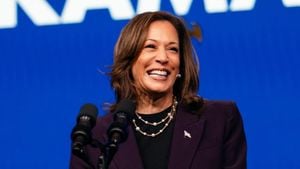With the 2024 U.S. Presidential Election fast approaching, the role of endorsements—whether from major news organizations or celebrities—has become more contentious and complex than ever. This election season, Vice President Kamala Harris and former President Donald Trump are at the forefront, not just of policy debates but also of the battle for influential support.
One significant turnaround has been the silence from some of America’s most prominent newspapers. The Washington Post and the Los Angeles Times, both held under billionaire owners, have chosen not to endorse any presidential candidates this year, marking what many see as the end of an era for candidate endorsements. Previously, these endorsements held substantial sway over public opinion and voter behavior, but changes within the newspapers' policies reflect broader shifts within the media world.
A spokesperson for Gannett, which owns numerous newspapers including some prominent regional titles, noted its decision to end presidential endorsements outright, stating, “Because we believe America’s future is decided locally, one race at a time.” This sentiment aligns with actions from the Chicago Tribune and others joining this trend, focusing more on issue-based commentary rather than candidate endorsements.
Some former proponents of endorsements argue their elimination signifies a reluctance to engage with the polarizing and unstable political climate. High-profile newspaper transitions have stirred discussions about corporate interests overshadowing journalistic integrity. Critics, including staff members within these organizations, have raised concerns about whether these decisions are more about business strategy than ethical journalism.
The fallout from these decisions has been swift and damaging. After Bezos intervened to block Harris’ potential endorsement by The Washington Post, over 250,000 subscribers chose to cancel their subscriptions. This significant loss, representing about 10% of their customer base, highlights how much readers value editorial freedom and independence. Bezos defended the non-endorsement, framing it as necessary to maintain the paper’s credibility and impartiality amid media skepticism prevalent among the American populace.
Harris, backed by notable celebrities including Taylor Swift and Beyoncé, has garnered significant star power, but some analysts suggest such endorsements may yield limited direct impact on voting behavior. Polling reveals disparities between celebrity support and tangible voter turnout. During the campaign, the Harris campaign spent $1 million on events featuring these prominent figures but results remained inconclusive. A New York Times analysis illustrated the paradox: celebrity endorsements can generate headline buzz yet fail to connect with voters concerned with mundane but pressing issues like the economy.
Meanwhile, Donald Trump has embraced endorsements like Robert F. Kennedy Jr.'s, positioning these validations as valuable assets for his campaign narrative, even if they don’t necessarily translate to additional votes on Election Day. Kennedy’s backing, originally thought to create significant ripples, resulted mostly in fluttering headlines without clear electoral gain. Polls suggested Kennedy’s supporters, drawn more by his infamous family lineage than Trump's agenda, didn’t flood the polls as anticipated. The analysis post-election showed little variation whether Kennedy was on the ballot or not, indicating the seemingly symbolic nature of his endorsement.
The contrasting dynamics at play reflect how the political endorsement ecosystem has evolved; what might have once seemed like golden endorsements are now frequently met with skepticism from the electorate. With Trump’s chronicled aversion to conventional media outlets and Harris’s reliance on traditional endorsements, the varied strategies highlight the uncertain terrain both campaigns navigate.
Trump’s comments during campaign rallies have latched onto the appeal of Kennedy’s endorsement as something immensely popular—self-satisfied claims about historic lineage combined with his provocative public persona often distract from substantive policy discussions. He has said, “Isn’t it great to have a Kennedy with us?” implying the celebrity associated with the endorsement bears weight regardless of real-world consequences.
This shift away from endorsements holds up against the backdrop of more than just declining reader trust; it also suggests traditional institutions might be reevaluated through the lens of viewer engagement and relevance to today’s voters. The rise of alternative media and influencers has been pivotal, with figures like Joe Rogan pulling younger, more diverse audiences who may overlook traditional media altogether. Analysts argue Rogan’s platform might have reached segments of voters Harris aims to sway—a demographic more drawn to candid discussions rather than orchestrated celebrity showcases.
Despite the significant endorsement power of high-profile celebrities of yesteryears, the political narrative suggests another evolution is underway. Perhaps the days of clear-cut endorsements leading to electoral success are behind us. Looking forward, it’s not just about making noise strategically; campaigns now must engage potential voters on issues directly impacting their lives.
If the current trend continues, the coming elections might be less about who endorses whom and more about how candidates navigate the complex, sometimes contradictory desires of the electorate. Will candidates maintain traditional ties with influential endorsers, or will new forms of voter engagement redefine what endorsements mean moving forward?



